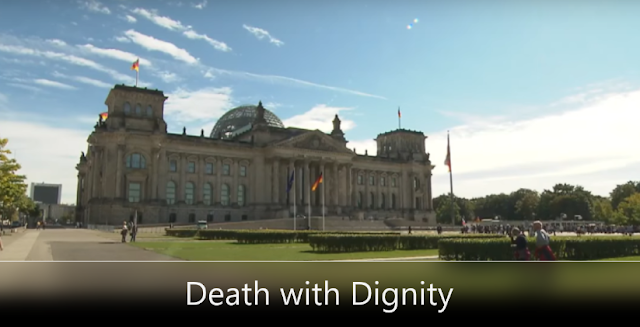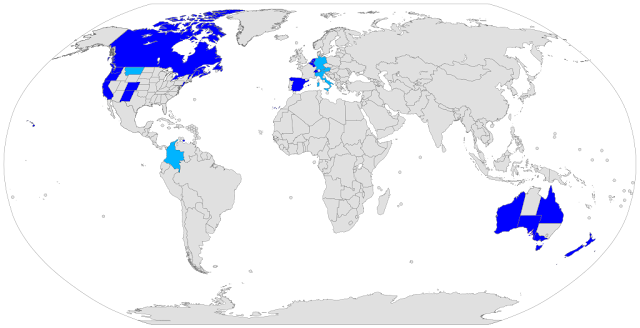We should give dying people the right to leave this world with dignity - Desmond Tutu
Archbishop Desmond Tutu has died at the age of 90
Desmond Tutu has said he would like the option of ending his life through assisted dying as he called on politicians, lawmakers and religious leaders to take action on the issue.
In an article published about 7 years ago - the emeritus archbishop of Cape Town and anti-apartheid activist reiterated his support for assisted dying:
"Dying people should have the right to choose how and when they leave Mother Earth"
Please read the original text on The Guardian or if it is not longer available Here is a copy:
Desmond Tutu plea for 'assisted dying' before historic Lords debate
During all my years of pastoral care, I have never had the privilege of being with someone when they die. I've visited dying colleagues and friends at St Luke's hospice, Cape Town, in the last period of their lives; I've witnessed their being cared for beautifully – but I've never been there at the exact moment of passing. I've been asked why I consider it a privilege to be present when temporal death takes place. It comes from my belief system. It is the wonder of a new life beginning, the wonder of someone going to meet their maker, returning to their source of life. In some ways, death is like a birth; it is the transition to a new life.
I am myself now closer to my end than to my beginning.
Dying is part of life. We have to die. The Earth cannot sustain us and the millions of people that came before us. We have to make way for those who are yet to be born. And since dying is part of life, talking about it shouldn't be taboo. People should die a decent death. For me that means having had the conversations with those I have crossed in life and being at peace. It means being able to say goodbye to loved ones – if possible, at home.
Recently I discussed my wishes with my youngest daughter, Mpho: my choice of the liturgy, the hymns, and who should preach. I'd like to lie overnight in St Mary's Cathedral in Johannesburg. It was such an important place in my life; it's where I became a deacon, where so many important things happened. I would like to be cremated; some people are not comfortable with that idea. I'd like my ashes to be interred at St George's Cathedral, Cape Town.
There are certain African traditions I am not comfortable with: the turning of photos to face the wall, the clearing of furniture from the bedroom and placing of straw mats for the women to sit on for days. I am comfortable that on my passing these traditions should not be followed. It concerns me how people get into debt at funerals, buying expensive caskets, slaughtering animals they can ill afford to pay for. I want to role model modesty. I would like a simple coffin, the one of plain wood, with the rope handles. I would like modest refreshments after my funeral. If people want to slaughter an animal as part of traditional ritual, I'd be happy with a sheep or a goat – it doesn't need to be a big animal. My memorial stone should also be modest. My concern is not just about affordability; it's my strong preference that money should be spent on the living.
This takes me to the question of what does it mean to be alive. What constitutes quality of life and dignity when dying? These are big, important questions. I have come to realise that I do not want my life to be prolonged artificially. I think when you need machines to help you breathe, then you have to ask questions about the quality of life being experienced and about the way money is being spent. This may be hard for some people to consider.
But why is a life that is ending being prolonged? Why is money being spent in this way? It could be better spent on a mother giving birth to a baby, or an organ transplant needed by a young person. Money should be spent on those that are at the beginning or in full flow of their life. Of course, these are my personal opinions and not of my church.
What was done to Madiba (Nelson Mandela) was disgraceful. There was that occasion when Madiba was televised with political leaders, President Jacob Zuma and Cyril Ramaphosa. You could see Madiba was not fully there. He did not speak. He was not connecting. My friend was no longer himself. It was an affront to Madiba's dignity.
It is important for all of us to talk about death and our dying. A survey was done of doctors in the UK in 2008. As many as two-thirds of them said they had difficulty discussing end-of-life care with their patients. Physicians were once healers of life and easers of death. In the 20th century the training for the latter has been neglected.
Death can come to us at any age. The clearer we are about our end-of-life preferences, the easier it will be for our loved ones and our doctors. I am coming to understand the importance of having a living will or advance directive, as some people call it. I do not want artificial feeding or to be on an artificial breathing machine – I don't want people to do their damnedest to keep me alive.
I've learned there are wider societal benefits to living wills. In La Crosse, Wisconsin, where physicians campaigned for decades for all adults to sign their end-of-life preferences, one benefit has been the savings, for families, for the government and healthcare companies – savings now used more creatively elsewhere. The second upside is that having discussions earlier in life seems to put people's minds at rest and they live longer – how else do you explain that life expectancy in La Crosse is now statistically higher than other similar geographies?
I was asked recently what I would wish for myself if I had a terminal illness and my quality of life was seriously deteriorating. This year I followed the case of the French doctor Nicolas Bonnemaison, who assisted several people to die. It was anticipated that there could be a heavy prison sentence. Several witnesses, family members included, wrote to support the doctor's actions as compassionate. The doctor was acquitted. There were jubilant celebrations. And Britain's supreme court recently ruled that a ban on assisted suicide is incompatible with human rights.
We need to revisit our own South African laws which are not aligned to a constitution that espouses the human right to dignity. On our own soil Craig Schonegevel, after 28 years of struggling with neurofibromatosis, decided his quality of life was too poor. He'd had so many surgical procedures the thought of enduring more was unbearable. He could find no legal assistance to help him die. On the night of 1 September 2009, he swallowed 12 sleeping pills, put two plastic bags over his head tied with elastic bands and was found dead by his parents the next morning. Craig wanted to end his life legally assisted, listening to his favourite music and in the embrace of his beloved parents, Patsy and Neville. Our legal system denied him and his family this dignity.
I am coming to understand the importance of language on this sensitive issue. The words euthanasia and suicide carry negative connotations. Suicide is considered a premature death often accompanied by mental instability. Craig's thinking was crystal clear; he wanted autonomy and dignity.
Some say that palliative care, including the giving of sedation to ensure freedom from pain, should be enough for the journeying towards an easeful death. Some people opine that with good palliative care there is no need for assisted dying, no need for people to request to be legally given a lethal dose of medication. That was not the case for Craig Schonegevel. Others assert their right to autonomy and consciousness – why exit in the fog of sedation when there's the alternative of being alert and truly present with loved ones?
I have been fortunate to spend my life working for dignity for the living. Now I wish to apply my mind to the issue of dignity for the dying.
I revere the sanctity of life – but not at any cost. I confirm I don't want my life prolonged. I can see I would probably incline towards the quality of life argument, whereas others will be more comfortable with palliative care. Yes, I think a lot of people would be upset if I said I wanted assisted dying. I would say I wouldn't mind actually.
On Mandela Day on Friday we will be thinking of a great man. On the same day in London, the House of Lords will hold a second hearing on Lord Falconer's bill on assisted dying. Oregon, Washington, Quebec, Holland, Switzerland have already taken this step. South Africa has a hard-won constitution that we are proud of that should provide a basis to guide changes to the legal status of end-of-life wishes to support the dignity of the dying.
On our continent of Africa, dying as an elderly person is a privilege. We are sadly too familiar with the early deaths of loved ones. War, violence, HIV/Aids and socioeconomic diseases take their toll. We need a mind shift in our societies. We need to think. We need to question. What is life? And isn't death part of living – a natural part of life?
Desmond Tutu is archbishop emeritus of Cape Town and a Nobel peace laureate. He is a member of the Elders, an international group of former political leaders brought together by Nelson Mandela to work for peace, justice and human rights
- - - - - - - - - - - - - - - - - - - - - - - - - - - - - - - - - - - - - - - - - - - - - - - - - - - - - - - - - - -
Please read the original text on The Guardian






If you like - Please send me your comment, or suggestion you may have.
ReplyDeleteI will not publish the comments. If you want a reply please don't forget to leave your contact information.
Sie / Ihr könnt gerne Kommentieren - Kommentare werden nicht veröffentlicht!
Aber wenn Du / Ihr eine Antwort erwartet bitte hinterlasst auch eine Email-Adresse - Danke